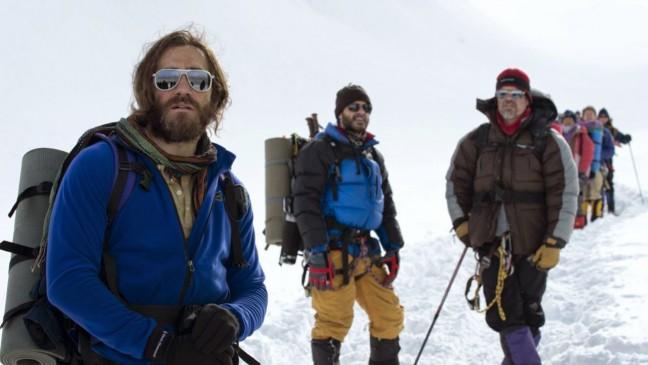Baltasar Kormákur’s “Everest,” a $55 million disaster/adventure film, takes on a challenge as seemingly insurmountable as scaling the mountain itself. “Everest” depicts the ill-fated 1996 expedition to bring amateur climbers to the summit of Mount Everest, and the subsequent deaths of eight climbers between May 10 and 11, 1996.
Notwithstanding the severe weather and inherent difficulty in capturing the nature of the mountain, this is no easy endeavor. Kormákur must not only tell the not-so-uplifting story of death in a most primordial sense, but also tell it accurately and with enough finesse to captivate audiences.
Clocking in at just under two hours, “Everest” certainly makes the mark. Led by a refined cast, including Josh Brolin, Jake Gyllenhaal, John Hawkes and Sam Worthington, each character embraces the challenge of summiting the world’s highest peak as if it were actually unfolding in real time.
The film begins as the climbers travel to Nepal, making fast friends in Kathmandu and embracing the 40-day expedition that will supposedly result in each reaching the highest point on earth, 5 1/2 miles above sea level.
Of course, the journey is not nearly as pragmatic as anyone could hope for; many experience difficulty acclimating to the high altitudes of the Himalayas and some begin showing holes in their expertise, a problem that will later become the focal point of the film. Beck Weathers (James Brolin, “Life in Pieces”), a wealthy Texan, pays Rob Hall, an experienced professional guide, to bring him to the mountain, in addition to others.
“Everest” and the 1997 book, “Into Thin Air,” on which it is loosely based, both aim to ask the question why amateur mountaineers should be able to buy their way to the world’s highest mountain, while others summit based only on their skill. The film does little to answer it, but offers enough perspective to show that for many, the thrill of doing something available to only a select few is reason enough to act.
While the film deftly portrays the mountain as the sole antagonist of the film, it falls short of making any truly adventurous strides toward a well-structured narrative. Some may find this a nice break from traditional storylines, while others may see this as a shortcoming. The pacing of the film will keep audiences on the edge for most of its duration, but the story itself is quite simple and lacks any dynamic characteristics.
Understandably, the plot is innately elementary. The goal is to reach the peak and to quickly ascend. The stakes are life and death. But “Everest” lacks the nuance necessary to make this tragic account any more meaningful than the latest big budget action film playing in the neighboring theater.
Though there is a watershed scene in which journalist Jon Krakauer (Michael Kelly, “House of Cards”) asks climbers why they chose to embark on such a dangerous mission, it is only this moment that provides brief context or character development that would have greatly enhanced a sense of allegiance to any particular characters.
Select scenes of peril showcase the high caliber acting only an A-list cast like this can produce. This takes the edge off any other issues with the film, like the set clearly engineered to look like a cold mountain.
Like any outdoor expedition, “Everest” has its fair share of triumphs and tragedies. It doesn’t aspire to be a groundbreaking installment in the story of man versus nature. But it humbly, anonymously and, for the most part, objectively depicts the events of the ill-fated attempt to do what few have ever done.


